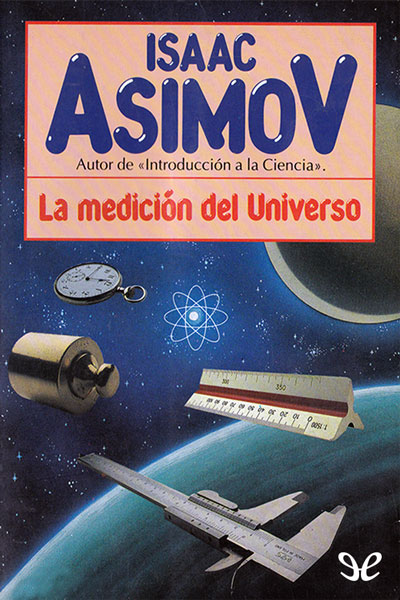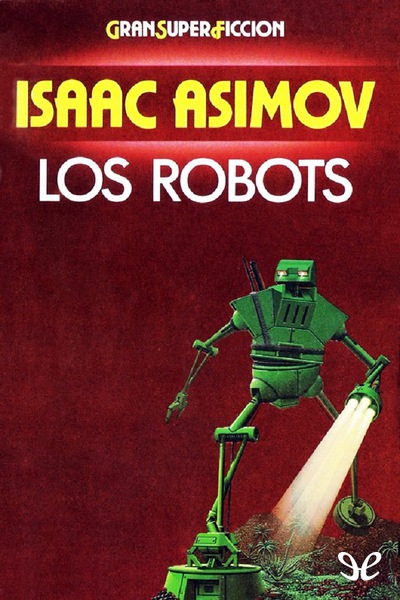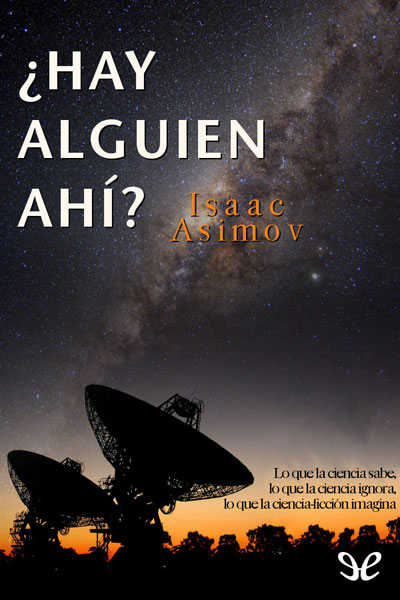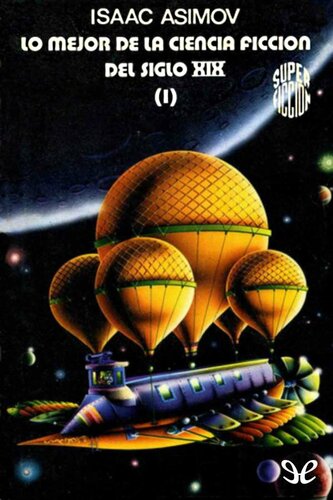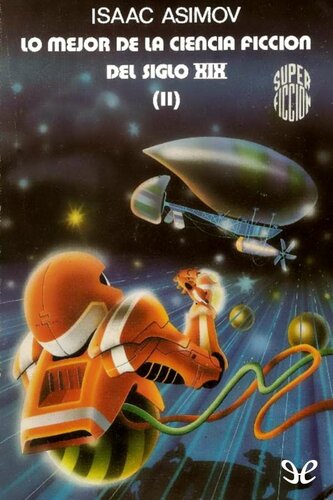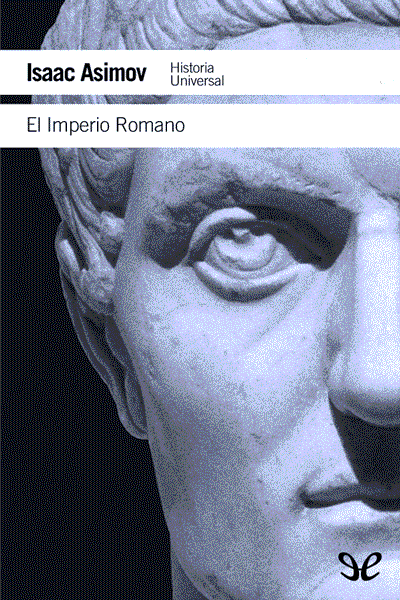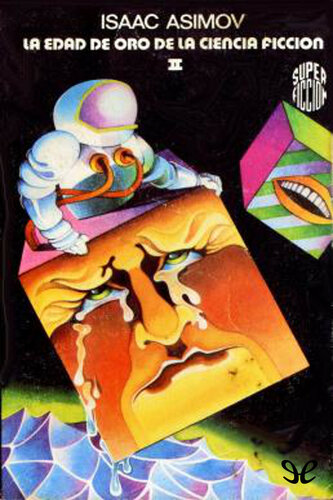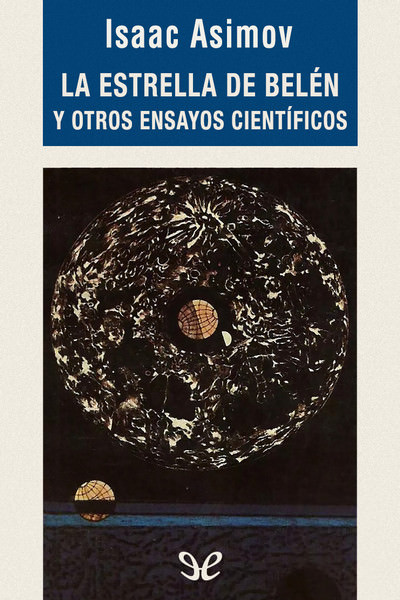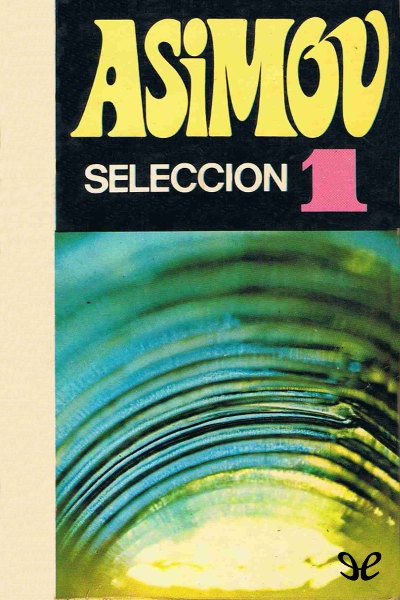oleebook.com
Guia de la Biblia Antiguo Testamento de Isaac Asimov
de Isaac Asimov - Género: Ficcion
Sinopsis
Isaac, Asimov Year: 2009
Libros Recomendados - Relacionados
Reseñas Varias sobre este libro
Excepcional trabajo de Asimov en este libro...
Llama la atención que Asimov sea ateo y se haya dedicado a crear esta obra desde un punto de vista meramente objetivo, dejándonos un festín de anécdotas curiosidades históricas y un sentido lógico de los acontecimientos que la Biblia misma no te lo da.
Se que no es del interés de todo el mundo pero para quien lo sea les recomiendo leer paralelamente con la biblia mis y verán como su comprensión va en aumento a medida que avanza la guía.
5/5asimov no-ficcion20 s Forrest Horton12 2
As an avowed atheist (and, of course, a prolific science fiction writer), Asimov provides an excellent guide to the incredible history recorded--albeit in contradictory and convoluted ways--in the new and old testaments. In this 1200-page two-volume tome, he largely avoids commenting on the spiritual and moral content of the bible, focusing instead on historical plausibility of biblical events. He discusses the phonetic origins of names and places ad nauseam, the religious and cultural influences exerted on early Jews and Christians, and the motives of biblical authors (among much else). I experienced many "Ah-ha!" moments when he described the origins of common modern phrases. My only complaint is that he provides no references, so it is difficult to tell where consensus among historians ends and where his personal speculation begins.
Overall, I found this book to be an admirable attempt to provide a thorough secular guide to the bible, one that has undoubtedly has been overlooked due to the glut of biblical literature with religious and/or political overtones.8 s Javier CasadoAuthor 16 books79
Si estás convencido de que la Biblia no es ni más ni menos que literalmente la palabra de Dios, entonces olvida este libro. Si aceptas la biblia como una obra humana que mezcla elementos históricos y mitológico-religiosos, entonces la lectura de este libro te puede resultar sumamente interesante.
En él se analiza en profundidad la biblia desde un punto de vista totalmente neutro, contrastándolo con lo que conocemos de la historia de esa región por otras fuentes y analizando la evolución de la religión judeo-cristiana a lo largo de los siglos en los que se fueron escribiendo los distintos libros que conforman la biblia (una estructura interna que también se analiza en este texto). Es una fantástica forma de conocer esta obra básica de la cultura occidental para todos aquellos (inmensa mayoría, creo, al menos en nuestro país) que no hemos leído la biblia o que, como yo, lo hemos intentado y hemos terminado abandonando por la aridez de su arcaico lenguaje o la complejidad que suponen sus cientos de personajes.
El análisis de Asimov (basado en realidad en otros análisis de expertos historiadores y estudiosos del tema) clarifica enormemente la lectura, como por ejemplo al aclarar la confusión de nombres de los personajes (un mismo personaje histórico a menudo aparece en la biblia con varios nombres diferentes, según el autor de esa parte utilice el nombre griego, el hebreo, el latino ). A través de las páginas de este denso libro (tan denso o más que la propia biblia) iremos descubriendo el antiguo testamento como lo que es, una crónica de la historia del pueblo judío, una sucesión de guerras de fronteras, intrigas palaciegas y acuerdos políticos entre las civilizaciones de la época en la región (egipcios, sirios, asirios, babilonios, fenicios ); todo ello adornado con la protección de Yahvé, el dios del pueblo de Israel, que los guía y los protege frente a los dioses de las civilizaciones vecinas.
Descubriremos también la sutil evolución de la inicial religión yahvista, henoteísta (creencia de que cada región tiene sus dioses, que sólo son poderosos en un cierto ámbito territorial) y primitiva (Yahvé empieza siendo básicamente un dios guerrero y amante de los sacrificios sangrientos) hacia una religión más elaborada, en la que poco a poco, con el paso de los siglos, va cambiando la concepción henoteísta por la de una religión más global, al tiempo que el dios se va haciendo más humano y compasivo, y a la vez que los rituales van adquiriendo complejidad. Veremos también cómo la religión yahvista va adoptando conceptos de otras religiones de las civilizaciones con las que va conviviendo a lo largo de los siglos. Asistiremos, por ejemplo, al nacimiento del concepto del demonio en una etapa muy tardía, y descubriremos las enormes diferencias entre lo que dice textualmente la biblia, lo que probablemente quería decir de forma metafórica, y la interpretación que le dan la religiones actuales de origen judeo-cristiano.
El libro es largo y exhaustivo, incluyéndose a menudo análisis versículo a versículo. La objetividad y neutralidad de Asimov es destacable a lo largo de todo el texto, diferenciando además claramente entre hechos objetivos (equivalencia constatada entre nombres diferentes, cronologías históricas, etc) o interpretaciones (forma de interpretar una metáfora, por ejemplo). Aunque realmente lo que más sorprende es lo poco que se necesitan las interpretaciones, siendo la mayor parte del texto de lo más claro (y totalmente alejado de cualquier interpretación sobrenatural) una vez se lee a la luz del conocimiento de la historia antigua de la región. La verdad es que no extraña demasiado que la iglesia católica prohibiera durante siglos la lectura de la biblia a sus feligreses, reservándose el derecho a interpretarla y "transmitirla" (a su modo): leerla sabiendo lo que se lee es una forma bastante efectiva de conseguir que pierda todo el aire místico que la envuelve, convirtiéndola sin más en una crónica histórico-mitológica de la región palestina y sus pueblos.
En resumen, un libro denso y complejo, pero tremendamente interesante para quienes sientan interés crítico hacia la historia de las religiones occidentales, o más bien del libro en el que se inspiran.5 s Alvaro60 24
Tengo que admitir que esta vez no he disfrutado tanto como otras veces de un libro de Asimov, en este libro echo de menos la fluidez de otros de sus libros de historia, cómo puedes descender de línea en línea de una forma suave y sin esfuerzo.1 Doram JacobyAuthor 1 book6
This fascinating book gave me a new perspective on the bible.
Don't get me wrong, I am still an Atheist but I do see this important book in a new light.
I now recognize the historical significance of these writings and know much more about it then I have ever learned in school (they taught us the Bible in such a simplistic way and only small, hand picked, parts of it).
Thanks to this book I now also have a more complete understanding of the empires and great powers of ancient Europe, Africa and the Near-East and how they connected and interacted with the Jewish nation (or more correctly- nations), of the birth of Christianity, its roots and its early history and of the real source of many modern phrases and rituals.
I recommend this book wholeheartedly for anyone interested in history or theology, whether he believes in god/s or does not.1 Juan Manuel62 1 follower
Un libro muy entretenido en el cual Asimov, de una forma muy clara y didáctica, va explicando diferentes pasajes del antiguo testamento, indicando en que época fueron escritos (aproximadamente), a que se refería el autor del pasaje y situando siempre el contexto histórico y geográfico. Asimov también explica como en el antiguo testamento se van recogiendo otros mitos, algunos más antiguos (como por ejemplo el del diluvio) y como en sus páginas han quedado restos de una versión más primitiva de religión: politeísta y henoteísta y cómo estos han ido evolucionando a medida que los textos que componen la biblia se van volviendo más modernos. 1 Ivan104 2
????? ?????? ????? ????? ???????? ?? ?????????????? ?????? ?? ????? ???, ?? ???????, ?? ?????????? ???????? ? ?????? ?????. "??????????? ? ????????" ? ????? ??-???????????, ???????? ? ???????????? ?????? ??? ?? ??????? ? ?????????? ????????, ?????? ?? ???????? ???? ???????????? ?? ????????? ??????????? ? ??????????? ?????????, ??????????? ?? ?????????? ??????? ? ??????, ????????? ?? ????? ? ???????, ?? ??? ?? ???? ?? ????????? ???????? ??????? ??? ?????? ?? ??-???????? ? ????? ??????????? ? ???? ??????? ?????? ??????. ??? ????? ?????????? ?? ???????? 700+ ????????, ???? ?? ??????????.1 SaraKat1,781 34
Asimov does his typically great explaining thing with the Bible this time. He points out mis-translations and ambiguities. I learned many new and interesting facts about the Middle East's history. He focuses on the historical context and doesn't comment on the moral aspects of the stories. This is a must-read for anyone who considers themselves a Bible scholar.1 Jen (Finally changed her GR pic)2,913 27
I've read up to his analysis of 1 Samuel and it is very interesting. He's focusing on the historical, rather than the religious side of the Bible, which does help in understanding where the writers of the Bible were coming from in that time period. So far, not bad. 1 Ariadna731,726 115
Lo maravilloso de Asimov es que recuerdas siempre algo de lo que te cuenta, y todo te sirve. Siempre aprendes algo y es fascinante de leer. Algún día sá que tendré tiempo para terminarlo y no me voy a arrepentir.
religion1 Pablo7 12
Un libro muy interesante pero algo denso.1 Kevin20 1 follower
Puts the Bible into historical perspective. I thought the explanation of some the recurring devices, genealogies, was illuminating1 Stefan Stanchev98 1 follower
????? ?????????, ??????????? ? ??????????? ??????. ????? ?????? ????? ??????????? ???????, ? ? ????????? ????????? ????????????.1 John P363 9
Note that Asimov's intent was to clarify the historical records contained in the OT. The timeline of events, movements of people, reigns of leaders, are made clear - not an easy task by any means since many of the books describe the same events by different people, in different times, with different agendas.
The audacity of the extremely prolific author to take on this challenge - 5 stars
The mind-boggling amount of research and detective work to decipher the works of the Old Testament - 5 stars
The actual historicity, stripped of the miraculous (of which Asimov does not treat in any significant way), to this reviewer - 3 stars
The seemingly endless battles for what turns out to be temporary control of the various regions of the middle east as told by the authors of the OT books will be of great interest to some.
Asimov brings a clarity to the story which is refreshing. Carlos Mock798 7
Asimov's Guide to the Bible: The Old Testament (Paperback) by Isaac Asimov
Isaac Asimov is my favorite Science fiction writer. Not everyone is aware that he's written multiple non-fiction books in very many subjects.
I was attracted to his take on the Old Testament, but sadly I thought the book was boring and did little to explore all the ridiculous statements that the books contain. Starting with the age of the Universe - 6000 years old - to many of the lies told about how long the OIld Testament characters lived - Methuselah purportedly lived to be 969 years old.
I was expecting scientific commentary on the inaccuracies of the Old Testament and instead, I found trivial explanations of where the Harden of Eden might have been located.
I was disappointed with the book and do not recommend it.
1 dejah_thoris1,286 22
I read this as a commentary to my daily Bible readings and I'm thankful I did. Asimov explains the symbolism, astronomy, political situation, and any other elements relevant to the selected verse. In the Old Testament's case, this really helped me understand all of the tribal interactions across time. Asimov also provided many prophetic cross-references between the two testaments to tie them together.
Dad must've used this one much more frequently than the other testament because the binding disintegrated. I've considered repairing it or keeping it bound in a rubber band, but I know I need to recycle it. I also considered removing the excellent maps, but I really can't come up with a good craft project for them. Oh well, I'm glad I read it at least once.
history non-fiction Luis Andrade M162 1 follower
Una buena y densa guía qué nos Lleva desde el génesis hasta el final del antiguo testamento con notas históricas (con la mejor información ubicando casa momento en una muy probable línea del tiempo), notas sobre las palabras, significados y lenguaje, así como relaciones entre los personajes para entender completamente y mejor el gran Libro.
No conocía este aspecto de Asimov, pero no le quedará a deber: es bueno en estos temas tanto como en la ciencia ficción.
Realmente bueno, independientemente de la religión que profese el lector. Stephanie Gordon162 2
Te cuenta la Biblia de manera novelada pero explicando dónde supuestamente están localizados los lugares que menciona, y la conclusión es que la mayoría de los lugares y personajes no tienen ningún lugar en la historia, o sea que estamos hablando de un libro casi en su totalidad ficticio, lleno de anacronismos y contradicciones. Y como no está contada cronológicamente, es un ir y venir que para nada te deja enganchado, lo cual lo hace pesado. Algunos datos están interesantes y se le puede aprender una que otra cosa. Gabriela Hassan7 1 follower
This book has been a great companion while reading the Old Testament. As an atheist, Asimov provides interesting facts about the context and history behind this part of the Bible. It helps a lot to understand why, how, and when these myths were collected. Of course, If you are a believer, this book is not for you. But if you are interested in the historical and political context of the Israel of the Old Testament, I highly recommend it. Petar Kalpakchi84 1 follower
?? ???? ??????, ? ? ????????? ?? ?????? ?? ????? "?????? ?????" ???? ?? ???? ?? ? ????? ??????. ???? ?? ???. ?? ???????? ???? ????? ?????????????? ??? ??????? ?? "?????? ?????" ? ????? ??????, ??????? ? ????????????. ?????? ?????? ?? ????? ?????? ?? ?? ??????? ???? ???? ?????????????? ?????????? ?? ? ?? ?????????. Kris193 3
Mostly a summary of the biblical verses with some attempt to determine the year they were written and who exactly the writers and characters were. An admirable piece of scholarship but it makes for pretty dry reading much of the time. Asimovs voice comes through too rarely. Daniel Pereira73
Muy bueno, leí la Biblia completa, pero resulta tediosa en realidad, pero gracias a este libro se logra obtener una mirada más amplia y del contexto en que se armó la Biblia.
Con este libro me queda más claro aún que la Biblia de historica poco, de cierta menos y de moral nada. Jose Seco Sanz220 15
I couldn't get into it.dnf history R. Jones369 3
Wait, so Hell isnt even in the Bible? Minifig421 17
Asimov hace en este libro (tanto en el tomo I, dedicado al Antiguo testamento, como en el tomo II, dedicado al Nuevo Testamento), un repaso de los libros de la Biblia.
Este repaso se hace desde un punto de vista racional, señalando el contenido de los libros pero, sobre todo, contextualizándolos en su época. Así, señala cuáles son lo hechos históricos posibles a los que se refiere el libro, pero también cuáles son sus errores comparándolos con el conocimiento real aportado por la historia y la arqueología.
Señala también la importancia de los libros para los gobernantes de su época, qué resaltan y qué ocultan para sus fines políticos, o cuáles son las incoherencias (tanto internas de cada libro como entre ellos).
Pese a todo, la arqueología de los lugares bíblicos es un tema controvertido que ha sido a menudo malinterpretado y que no ha podido se dilucidada con mayor claridad hasta basarse en métodos modernos como la datación por radiocarbono, que ha dado lugar a la revisión de muchas fechas.
En este sentido, los libros de Asimov fallan al contextualizar e interpretar libros del Antiguo Testamento. Por ello, resulta muy interesante leer "La biblia desenterrada" de Silverman y Filkenstein antes de afrontar la lectura de estos libros, a fin de tener conocimiento previo de en qué errores incurre Asimov (pues su guía es anterior a esta revisión de datos arqueológicos).
Pese a todo, la Guía de Asimov sigue siendo un libro muy interesante de leer para todo aquel que quiera interesarse por la Biblia de una forma objetiva y racional.no-ficción Maximiliano16 9
Un excelente libro de historia. Para sacarle más provecho es conveniente haber leído los primeros libros de Historia Universal Asimov. Por lo menos El Cercano Oriente, La Tierra de Canaán y Los Egipcios (y, opcionalmente, también Los Griegos).
La única crítica es a la edición española, que en todo el libro usa las traducciones españolas de los versículos citados por el autor. Como éstas no coinciden con las de las ediciones de la Biblia que usa Asimov, el traductor debe poner incontables notas al pie para aclarar las diferencias.
William Orr176 2
I bought this book in Voertman's for $6.95 when I was in my first senior year. Been meaning to read it ever since.
Asimov really doesn't disappoint. His writing is clear, he is curious, loves words, loves history, and has an analytical mind. He does jump around a bit and there is no overall philosophy except framing the Old Testament with historical context that interests him (and should interest you).
At the end, I feel he left lots of data out, but there was still a lot of detail in the book.
Now on to the New Testament!history Hugo Charles97 24
Asimov hace una investigación sobre las civilizaciones, culturas y hechos que afectaron para la creación del Antiguo Testamento, las influencias, reinos, personajes clave, así como costumbres, festividades que moldearon las propias, libro por libro instruye con los datos posibles de su creación según los concilios y los contrasta con lo que hemos aprendido de la Media Luna Fértil, un repaso increíble sobre Mesopotamia, los Medos, Persia, Asiria, Babilonia, las diferentes dinastías egipcias, los Fenicios e incluso los griegos y grupos indios.2019 favorites historia Sharonlee48
Amazing amount of research, much of the info didn't penetrate my thick skull, but here and there some interesting insights on how the bible was written, what was going on during that time period that we know about from other, contemporary accounts. Most striking fact: We apparently are living in the wrong year, if we're counting from when Jesus was born. Albert Sala4
Autor del comentario:
=================================
